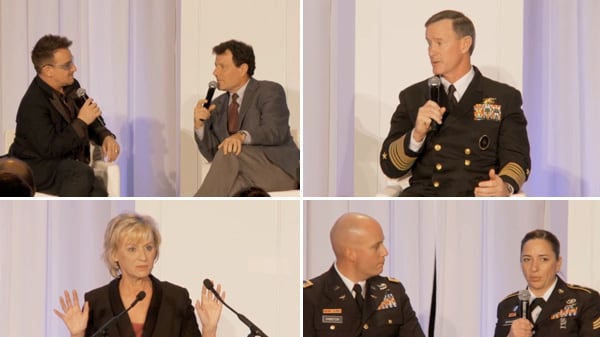Tina Brown: True Heroism Isn't Flashy
Newsweek & The Daily Beast’s editor in chief launched the summit by honoring the heroes in attendance. In the wake of a divisive presidential election and a widening gap between the military and civilians, Brown stressed that heroism is a paradox that requires both leadership and selflessness. “One thing that every hero said who we invited to join us at this summit," she noted: ‘Don’t call me a hero. I’m not a hero.’”
Did McRaven Ever Doubt the Bin Laden Raid? No.
Was there ever a moment when Adm. William H. McRaven thought the raid on Osama bin Laden’s compound wouldn’t work? “No,” he told Charlie Rose in a conversation on "What Makes a Hero." McRaven commanded the raid on the bin Laden compound in May 2011—an operation that he called a “courageous decision” on the part of President Obama. For the admiral and his team, the raid was just another day on the job. “While it was a little bit more complex," McRaven said, "at the end of the day, for us, it is what we do. So the challenges of the mission, I think, have been blown a little out of proportion."
McRaven: Holly Petraeus Is an ‘American Hero’
Does Gen. David Petraeus’ cheating scandal have any bearing on his military achievements? I've “never seen a guy more committed to his job” than Petraeus, McRaven told the summit. Speaking strictly about Petraeus’s work in the military, he praised both the former CIA head and Gen. John Allen. “They are two of the finest officers I’ve ever worked with, and I’ll leave it at that,” McRaven said. Petraeus’ wife, Holly, is an “American hero,” he added.
DUSTOFF 73's Daring Mission
In Sgt. Julia Anne Bringloe’s harrowing account of flying into the mountains of Eastern Afghanistan to save her comrades, she said the hardest part of the mission, DUSTOFF 73, was waiting for clearance to start the rescue. “My job is to get to my patients, and when I can’t get in there it’s just exasperating,” the medic said. After Bringloe was lowered to the ground to rescue a soldier, the trip back up into the helicopter was far from smooth. Here, Bringloe and the rest of the medevac crew open up about the mission with ABC’s Martha Raddatz.
Nicholas Kristof: Activist, Journalist, or Both?
Not all heroes wear uniforms. Bono, the lead singer of U2, reversed roles with the New York Times columnist for an interview about Kristof’s international reporting. After lauding the writer as one of his own heroes, Bono asked Kristof if he’s ever been accused of crossing the line from journalist to activist as a result of championing certain issues. “I’ve kind of looked in the mirror sometimes and wondered, you know, why am I straying a little far,” Kristof said.
Weston: ‘I Don’t See a Lot of Heroes in Washington’
Former State Dept. official J. Kael Weston stayed in the Middle East for seven years—long after he wanted to come home—to see his work through to completion, he told The Washington Post’s Rajiv Chandrasekaran. Now writing a book about his experience, Weston spoke about the "mirror test," when a disfigured soldier looks at himself for the first time after he’s been injured. He then called for the U.S. to take its own look in the mirror. "I do believe there are heroes out of these wars," he said, "I just don’t see a lot of heroes in Washington."
Harman: Most Americans Don't Care Very Much
Is it possible for the general public to understand foreign relations when so few lawmakers know the nuances themselves? In the panel “The Next War, The Next War Hero,” U.S. Rep. Jane Harman called for more humility in government. "The problem is we are ignorant of the world and our role in the world and the need for … a narrative about what we stand for," she said.
Alfred Rascon's Profile in Courage
U.S. Army medic Alfred Rascon’s last rites were delivered after he was injured in the Vietnam War—but that didn't stop him from trying to rescue his comrades. Thirty-four years later (after sorting through his long-lost paperwork), Rascon received a prestigious Medal of Honor. "They’re trying to take care of me," he told the audience of his actions during the war, and "I’m trying to say, ‘Don’t take care of me, I’ve got to take care of the rest of the people.’ "
What Compels Someone to Serve?
Gunnery Sgt. Tawanda Hanible said she joined the Marines after her brother enlisted, leaving behind her children to go to war. While the experience wasn’t what she thought it would be—it wasn’t the “glorified” service she saw on TV—she found the motivation to continue in her daughter. “I missed her a lot," she said. "But, at the same token, it was I need to do this for my country and I need to do this for you."
How to Cope with a 'Moral Injury'
Maj. Sarah A. Shirley, a chaplain, said she joined the Army to be with “good people who were doing bad things because it was good to do them, in that weird way that happens in life and certainly in war.” In a panel on the Psychological Wounds of War, Shirley added that those who serve ought to be offered sacred spaces where they can cope with the emotional trauma or "moral injury" of battle together.
Sec. Madeleine Albright: Stevens Didn't Lead From Behind Walls
Ambassador Chris Stevens, who died in September in an attack on the U.S. consulate in Benghazi, has been lauded for his work on the ground. In a conversation about diplomats on the front lines, Ambassador Ryan Crocker, Secretary of State Madeleine Albright, and Bernard-Henri Levy remembered their colleague. "I remember him in the ground ... He had a little security. I know that there was polemics about this. It was probably his taste and his will to be free," Levy said. As for the controversy surrounding security, Albright weighed in on the complications of working in a heavily guarded embassy. "It's very hard to conduct business in that particular way," she said. "I think that there really are issues how one carries on in the 21st century under these kind of conditions when you need to get your ambassadors out and they need to fulfill their roles."
Pussy Riot’s Imprisonment: An Escalation of Putin’s Rule
The escalating discipline against Pussy Riot isn't an isolated event, but rather an example of the Russian government's growing reach. Garry Kasprov, chairman of the United Civil Front, has risked his safety by defying Vladmir Putin. He calls the action against the band an indication of larger problems. "It’s not just Pussy Riot…During the last sixth months Putin’s controlled Parliament, he passed a number of draconian laws," Kasprov said.
Sleeping with an Activist—and George Clooney
It’s been a week in high-profile affairs, but Nick Kristof assured Bono that he only shares a bed with one activist—his wife, writer Sheryl WuDunn. But, what’s it like in the Kristof-WuDunn household? The New York Times columnist said he and his wife have exposed their children to social issues through traveling. “In retrospect, I think she felt a little cheated when she discovered her Caribbean holiday was Haiti during the cholera outbreak,” he said of a trip with his daughter. As for sharing a hotel with George Clooney: “Let me explain,” Kristof quipped.
Crumpton: I Applaud Gen. Petraeus
In a panel on unsung heroes, historian Andrew Roberts, author of The Storm of War, asked Amb. Henry Crumpton if he applauded Adm. William McRaven's support of the disgraced genera-and Crumpton, the former coordinator for counterterrorism at the CIA, echoed the commander. "I would have to applaud General Petraeus," he said. "I respect him for the service to our country, however I think like many Americans I am also deeply disappointed and saddened."
Sorkin: We're Eating Each Other Alive
First McChrystal, now Petraeus. Why does the public revel in watching a hero's downfall? In a conversation with editor-in-chief Tina Brown, screenwriter Aaron Sorkin said we're not just eating our heroes as a culture-we're eating everyone. "It fulfills a not very heroic desire on our part to feel superior to other people. It's voyeuristic," he said. Earnestness and sincerity, though initially encouraged after the 9/11 Attacks, don't often gain as much traction, Brown added.
Sorkin Spills Secrets About Jobs Biopic
Speaking with Newsweek & The Daily Beast editor-in-chief Tina Brown, screenwriter Aaron Sorkin gave fans an early taste of what his Steve Jobs movie will look like. 'I hope I don't get killed by the studio for giving too much away,' Sorkin said, 'but this entire movie is going to be three scenes, and three scenes only, that all take place in real time.'
Military Translator: I Know What Hell Looks Like
In 2003, Haidar Khairallah, an interpreter in the 82nd Airborne Division in Baghdad, lost his leg during a firefight while trying to save an American soldier’s life. In a panel called "They Risk It All: Iraqi and Afghan Translators," Khairallah opened up about how his experience serving as the eyes, ears, and mouth of American troops influences his life today. “All my friends," he said, "I tell them, look, please, don’t fuss about bills, Facebook, Starbucks. I’ve been in hell. I’ve seen hell—how it looks like."
Military Wife: I Only Recognized My Husband’s Tattoos
After shrapnel struck Patti Walker’s husband, military officials said he would remain in a vegetative state, at best. In a panel called The Other Side of Sacrifice: Military Families, Walker told an emotional account of seeing her husband after he had brain surgery—and barely recognizing him. In a touching moment, ABC's Deborah Roberts asked the audience to applaud her husband, who was in attendance. Watch the standing ovation.
Foreign Service 'Moves To the Sound Of The Guns'
Amb. Ryan Crocker—the man whom Gen. McRaven called his hero, the former ambassador to Afghanistan, Syria and Iraq (among other nations), and a diplomat under four presidents—explained what makes the foreign service tick.
When a Vet Refuses to Be Called a Hero
Brian Castner spent two years defusing bombs in Iraq and served as an explosive ordnance disposal (EOD) officer from 1999 to 2007—yet, he rejects being called a hero. In a conversation about What It Takes to Defuse a Bomb, Castner said we’ve set the bar of heroism too low—he’d rather approach an IED than face bullets. “When we call them heroes, we let ourselves off the hook…if we saved that term, maybe it would ennoble all of us to do that much more for everyone else,” he told ABC’s John Donovan.
Jobs for Vets: A Matter of National Security
Unemployment is a critical challenge for vets returning home from war. In the final panel on Vets: America’s Secret Economic Weapon, Mike Haynie, founder of the Institute for Veterans and Military Families, said if the country is going to sustain an all-volunteer military, we must provide jobs for soldiers returning home. “You look at any military recruiting slogan campaign in this country, it’s all about ‘join the military because you’ll be better off coming out the other side,’” he said in the closing thought of the summit.







